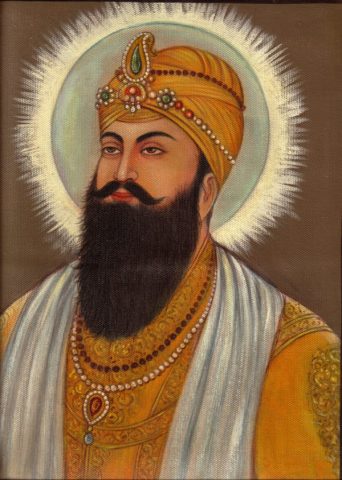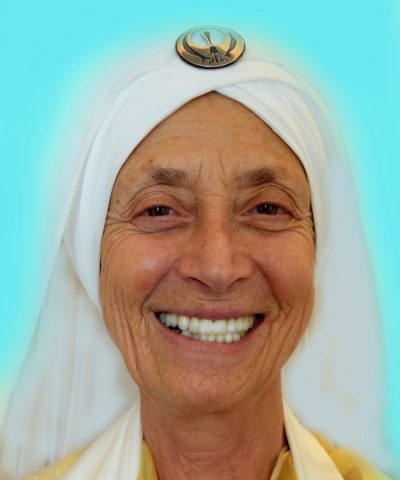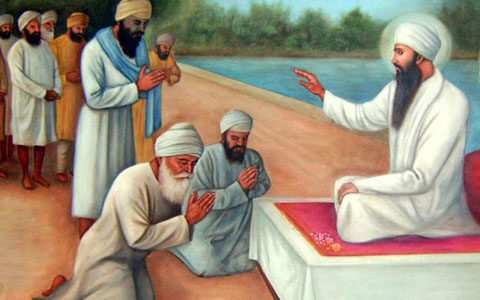by SS Sangeet Kaur Khalsa, Espanola NM
Spring 2012
Our beloved teacher, the Siri Singh Sahib ji, was a Saturn teacher, unstoppable in his quest for us to fulfill our destinies. He said, “I am your teacher. I will always want more. I have a bottomless hunger for your excellence.” We all have stories of how he chiseled us in his quest for our excellence.
I once heard him say that the only siddhi he didn’t possess was the gift of music.Yet there were times when he would give our musicians a master class in how to sing a shabad in perfect Naad! Guru Arjan Dev Ji was precisely such a Saturn teacher.
In my very early days in the Dharma, I came across a passage in Indian Classical Music and Sikh Kirtan by G.S. Mansukhani, describing the standards Guru Arjan Dev held for the Ragis (musicians) of his Court:
- The singer must be mentally alert and his heart full of devotion to God.
- He must keep himself detached from worldly affairs and must not run after money.
- He must cultivate good habits and practice the Sikh virtues – truth, contentment, faith, compassion, patience.
- He must be neither proud of his talents nor hypocritical.
- He must practice the presence of God and experience real joy and peace.
- He must regard himself as a devoted servant of the sangat.
The Wedding Ragis
 There is a story that illustrates Guru Arjan’s mastery as a teacher to the Ragis. Satta and Balwand, father and son, were the most popular Ragis in the Guru’s Court. When Satta’s daughter was to be married, he asked the Guru for extra money to cover the wedding expenses.
There is a story that illustrates Guru Arjan’s mastery as a teacher to the Ragis. Satta and Balwand, father and son, were the most popular Ragis in the Guru’s Court. When Satta’s daughter was to be married, he asked the Guru for extra money to cover the wedding expenses.
Guru Arjan responded that they would receive whatever donations the sangat gave that day for their kirtan playing, as per usual. Father and son were not pleased, and decided to stop performing in the Guru’s Court. Being the “best ragis,” they were certain the sangat would be upset and boycott Guru Arjan’s court in protest. Of course, this did not happen.
Instead, Guru Arjan himself began singing the shabads, joined in bliss by the sangat. As for Satta and Balwand, history records that they were “afflicted by ulcers…and no one would allow them to stand nearby.” Father and son tried to get back into Guru Arjan’s good graces.
He responded that they could be pardoned by the Guru’s Court if they were to compose a shabad “praising the Guru’s institution in the same way in which they had decried it.” That shabad in praise of Guru Ram Das, the father of Guru Arjan, was Dhan Dhan Ram Das Gur. It was the miracle that transformed the lives of Satta and Balwand.
It is said that this shabad reaches the realm of miracles, where the impossible becomes possible. hen life seems stuck, praise the domain of Guru Ram Das, the realm of true Reality, the realm of the heart, of the neutral mind, where all things become pure.
The following is one of the many shabads by Guru Arjan Dev Ji that express his utter devotion to the sacred Gurbani, the sacred sound current, as the soul’s medicine, available to us at any moment:
HAMAAREE PI-AAREE AMRIT DHAAREE
It is my Beloved; it is a shower of nectar
The Guru has not shielded it from my mind, even for a moment
Beholding it, touching it, I am sweetened and delighted
It is imbued and drenched with the Creator’s Love
Uttering it for even a moment, the mortal rises unto the Guru
Meditating upon it, he is not trapped by the messenger of Death
The Lord has placed His garland of Gurbani, O Nanak
Around my neck, and in my heart.
About the Author
 SS Sangeet Kaur Khalsa is an ordained Sikh Dharma Minister. As a longtime student of Yogi Bhajan, Sangeet sings, teaches, composes and records sacred music drawn from the poetry and technology of the Siri Guru Granth Sahib (the sacred Sikh scriptures). This technology is designed to open the heart and expand the consciousness, and is the foundation for the study of Sound and Mantra. Sangeet teaches throughout the US and Canada, helping students to experience their voices as vehicles for self-healing and healing others through this sacred sound current. Sangeet Kaur is a longtime member of the Sikh Dharma Ministry Newsletter Team and is a member of the International Khalsa Council.
SS Sangeet Kaur Khalsa is an ordained Sikh Dharma Minister. As a longtime student of Yogi Bhajan, Sangeet sings, teaches, composes and records sacred music drawn from the poetry and technology of the Siri Guru Granth Sahib (the sacred Sikh scriptures). This technology is designed to open the heart and expand the consciousness, and is the foundation for the study of Sound and Mantra. Sangeet teaches throughout the US and Canada, helping students to experience their voices as vehicles for self-healing and healing others through this sacred sound current. Sangeet Kaur is a longtime member of the Sikh Dharma Ministry Newsletter Team and is a member of the International Khalsa Council.


